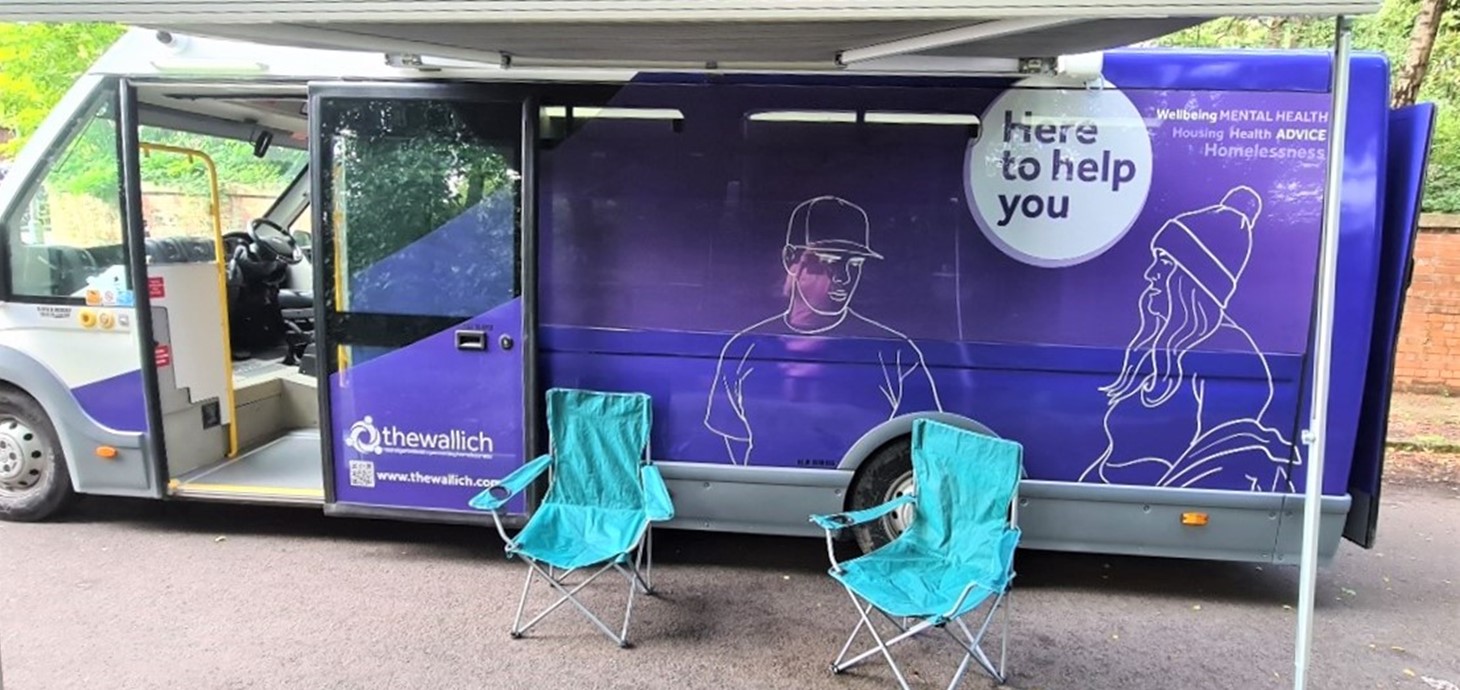
Using facilities such as their mobile support vehicle (pictured), The Wallich team alongside NHS health board staff will carry out routine antibody screening for hepatitis C amongst the homeless and precariously housed people they work with.
People who are homeless or precariously housed are to be routinely offered lateral flow tests for hepatitis C, followed by rapid PCR tests to speed up diagnosis and treatment and therefore reduce the risk of transmission.
The project is led by The Wallich, Wales’s leading rough sleeping and homelessness charity, with support from experts at Swansea University’s Healthcare Technology Centre and Swansea Bay University Health Board.
Hepatitis C is an infectious virus which particularly affects marginalised and vulnerable populations such as homeless people. It has become more widespread during COVID-19. Untreated, hepatitis C can lead to cirrhosis, liver failure, and liver cancer.
However, early diagnosis can make a big difference, which is where the new project comes in.
Using facilities such as their mobile support vehicle, The Wallich team alongside SBUHB staff will carry out routine antibody screening – similar to lateral flow tests used for detecting coronavirus – amongst the homeless and precariously housed people they work with.
This means people who test positive can be tested using a rapid PCR to confirm the presence of an active hepatitis C infection. This leads to the individual being treated immediately and advised about safe behaviour. Otherwise, they could be waiting up to six weeks for a normal PCR test result, in which time further unknown infections could have occurred.
The project is being implemented after the idea was successfully demonstrated in a project in HM Prison Swansea, which resulted in the world's first known case of eradication of the virus in a remand prison.
Experts from the Healthcare Technology Centre in Swansea University Medical School are working alongside partners on the project. Their role will be to analyse the data that will be gathered by The Wallich as the testing programme progresses.
Edward Miller from Swansea University explains:
"We’ll be using the data that comes in for two purposes. The first is to assess how effective the testing is proving to be for the rapid diagnosis of hepatitis C, so we can see how much benefit there would be to expanding the scheme.
The second is to establish a picture of the prevalence of hepatitis C within the homeless population. There are currently no accurate figures on this, so this data will be invaluable in understanding the scale of the problem.
Accelerate helps innovators in Wales to translate their ideas into solutions, enabling them to be adopted in health and care. Our collaboration with The Wallich on this project is a perfect example."
The screening programme brings other benefits. People who are homeless and precariously housed are often missed when it comes to healthcare checks, so the scheme will benefit them and reduce the overall number of people in Swansea with hepatitis C. It also gives them a point of contact and positive experience with healthcare workers, which offers an opportunity to be directed to support for their other needs.
Jason Nancurvis, Head of Mobile Operations at The Wallich, Wales’s leading rough sleeping and homelessness charity, said:
“We’re so pleased to be working with Swansea Bay University Health Board and Swansea University to help the people we support address problems with their health.
Often when people experience homelessness, their physical and mental health can be harmed in the process. However, accessing healthcare and attending appointments in the traditional way may be difficult for them. That’s why we developed our mobile operations team to go out to people, offering services on their terms, wherever they are.
“As well as providing housing and homelessness support, it’s becoming more and more clear that when our vehicles go out and park up, people trust us and other professionals riding with us, to access support. Whether that’s nurses, job coaches or homelessness support workers, taking support to the streets helps to reach more people.
This was proven best during the COVID vaccine rollout we worked on, for example. We just know that working collaboratively out in the community to tackle peaks of blood-borne viruses will without a doubt also reduce harm to people experiencing homelessness.”
Health Innovation - Swansea University research
